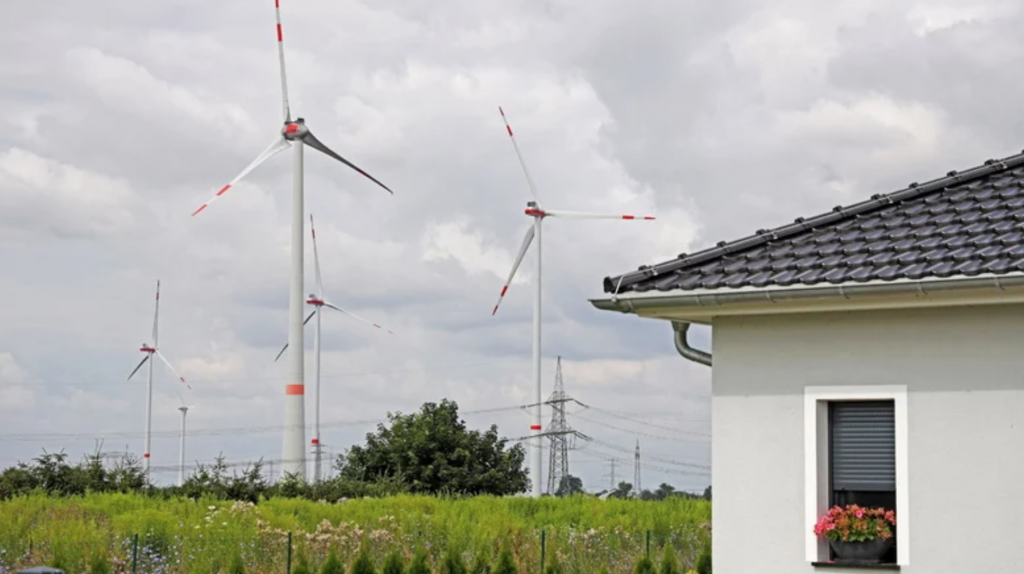From George Moeritz
Chemnitz. The electricity market is on the move: Since energy prices rose sharply a year and a half ago and some retailers went out of business, most municipal utilities also stopped advertising different rates. New customers generally had to pay the expensive basic supply tariff - often more than 40 cents per kilowatt hour, until the government applied the electricity price brake at this level. But now utilities are courting consumers again. Envia-M based in Chemnitz, Germany, announced a "limited offer" on Wednesday.
The eastern German energy supplier, which has more than 1.3 million customers, plans to introduce a pricing model called "Naturstrom von hier" for around 1,000 households. The company said customers would be able to buy "regional electricity" from renewable energy sources from plants in Saxony. In this case, the electricity comes from three wind power plants in the districts of Central Saxony, Zwickau and the Erzgebirgskreis.
It is not technically possible to send individual portions of electricity from a specific wind turbine to a specific home elsewhere in Saxony. But Envia-M promises customers certificates of origin for the electricity supplied, so that the amount supplied is actually generated by the named turbines. The certificate is supposed to say which wind turbine is the source.
Green electricity is offered with a 50 euro bonus
The company does not specify the price in its press release. However, prices can be called up on the company's website if a town and a quantity are entered. Accordingly, for example, a household in Waldheim with 2,500 kilowatt hours of consumption per year must pay a price of 43.02 cents per kilowatt hour for the "Naturstrom von hier". The basic price per month is also 12.09 euros. A company spokeswoman said on inquiry of sächsische.de, the consumption prices are "very different, depending on where one lives". That also depends on levies and network charges. She could not give a range.
With the contract, the customer commits himself to this electricity tariff for an "initial term" of twelve months. In return, Envia-M offers him a bonus of 50 euros. With a decrease of 2,500 kilowatt hours are to be paid according to data on the Internet side thus at the example forest home 101,71 euro monthly, thereby the bonus is already taken off. That is more than in the tariff "my river best", which has however 24 months contract running time, but somewhat less than the price in the basic supply. There, Envia-M currently charges 43.51 cents per kilowatt hour. Because of the electricity price brake at 40 cents, the state takes over 3.51 cents of this for 80 percent of the electricity volume.
At Price comparisons on the Internet customers should note that a bonus such as the 50 euros from Envia-M only has a one-time effect. They should also compare the term and notice periods - you should not tie yourself down to an expensive electricity tariff for a long time. Basic supply contracts can be terminated with two weeks' notice.
Envia-M announces dynamic tariffs
The Eon Group recently announced that it would be reducing prices for millions of its customers as of September. These customers have already been informed. Envia-M belongs proportionately to the Eon Group, but also to eastern German cities and municipalities. Envia-M has reduced electricity and gas prices in July. But they are still above the state price brakes. Sachsen-Energie in Dresden, with its Drewag and Enso brands, had announced that it would not be lowering its electricity prices for the time being, especially as they are lower than those of its neighboring company Envia-M and are generally below 40 cents per kilowatt hour.
Envia-M is going even further in testing its customers: In addition to the new electricity tariff for wind power enthusiasts, the eastern German company is also already announcing "dynamic tariffs". They are not yet available, but interested parties can register for them on the website. They will then receive "exclusive information" even before the new tariff is bookable.
The dynamic prices under this model are to be based on the exchange price and vary during the day. Customers can then adjust their electricity consumption and, for example, switch on the washing machine when the price is slightly lower. The setting options for such dynamic tariffs The Dresden-based software company Kiwigrid, for example, is working.
In the future, electricity prices will increasingly depend on whether there is a lot of solar and wind power available at any given time or whether expensive gas-fired power plants have to be brought on line as well. This is also likely to become important for owners of electric cars who want to charge their batteries at certain times or even sell the electricity from the battery back to the power grid when they do not need the car for some time.








